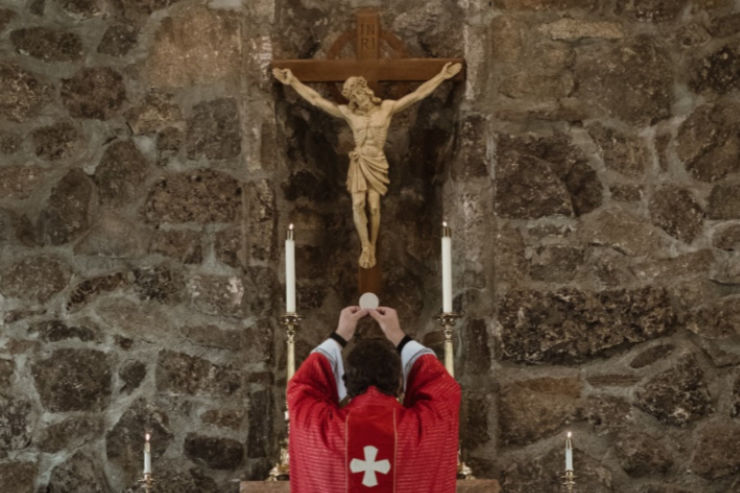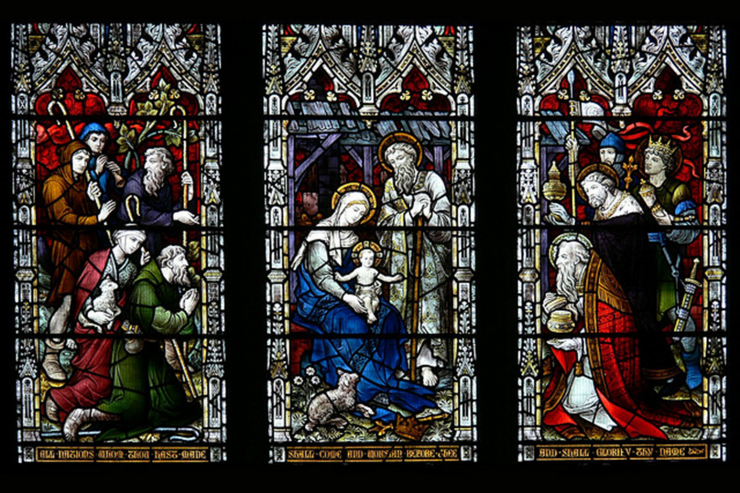Taking things for granted comes easily. It’s the default.
Whenever I experience writer’s block, I go through a series of actions – read the readings of the day and of the upcoming weekend; look out the window; work on another project. Today, when all of these things failed, I picked up Bishop Barron’s new book on the Eucharist, simply titled Eucharist.
I had received the book from Word of Fire as a gift, but it sat on my table for a few weeks. To be brutally honest, I didn’t rush to read it because I didn’t think there would be anything new between its covers. I know what the Church teaches about the Eucharist. I have written about the Eucharist, given talks about the Eucharist, and prepared Bible studies on the Eucharist.
We know that the average Catholic’s belief in the Eucharist is one of the crises our Church faces today. I do not believe it’s a crisis of faith as much as a crisis of catechesis. How can a Catholic not believe in the Real Presence but still go to Mass? How can someone believe they can receive the Eucharist while simultaneously rejecting various Church teachings? It most likely can be traced back to a lack of catechesis and a failure of actual evangelization.
So I picked up the book, my mind on the crisis. I was thinking of those who didn’t believe in the Eucharist or didn’t understand the Eucharist.
Yet even before I began to read, I realized I should be thinking of myself. Yes, I have read extensively about the Eucharist. I have taught and written about the Eucharist.
But that doesn’t mean I don’t need to read more. Because let’s face it. We all could use an increase in devotion, in passion, in faith, and in understanding. We could all use an increase in gratitude.
There was wailing and gnashing of teeth last year when we were all deprived reception of Holy Communion. And rightly so. I remember thinking I would never take the gift of the Eucharist for granted ever again. Has that resolution stuck?
Gratitude needs to be cultivated.
Taking things for granted comes easily. It’s the default. It’s like placing a piece of wood in a stream, which will lazily drift downstream. Living in gratitude is not our default setting. It requires swimming upstream, against our tendency to accept good things without thinking.
We accept many of the gifts we have been given daily without thinking. Then, how quickly I become angry or antsy when normal life is interrupted, when things do not go my way, when I suffer a deprivation of some kind. How fast I lose my peace when things I have taken for granted suddenly stop or get disrupted.
Perhaps I should be thankful for those things when I have them, so when they go away or I lose them, I will not so much lack peace as be grateful I once enjoyed them.
Whether the gifts in our life are physical, emotional, or spiritual, we have to fight against the tendency to take them for granted. In the spiritual life, that means never being complacent with our knowledge or with our devotional life. Perhaps you have read the Catechism? Read it again. Maybe Scripture is simply the thing you hear at Mass? Begin practicing lectio divina. The Rosary has become banal? Find a new way to mediate on the mysteries (art or Scripture or perhaps with an aid like a prayer app).
Ask God to help you to stop taking the gifts for granted. Ask him for an increase in faith, hope, and love.
After all, Eucharist means thanksgiving. The Eucharist is an “act of thanksgiving to God” (CCC 1329). Next time you go to Mass, pay attention to every time the prayer of the priest mentions giving thanks. At the offertory, imagine the ushers carrying forward not only bread and wine and perhaps a basket of money, but all the gifts you have been given – your family and friends and health and job and your Catholic faith and the simple fact that you woke up that morning… All of that, carried up to be placed on the altar as a giant gift of gratitude to the Lord. Ask him to help you stop taking any of it for granted.
It’s a temptation to read about the crisis of belief in the Eucharist in the Church and think, “Well, at least I’m not them…” But at the end of our lives, we aren’t going to be judged next to someone else. God is going to look at what we have been given and what we have done with those gifts. Have we taken the incredible gift of our Catholic faith, the sacraments of the Holy Eucharist and Confession, the intellectual riches of the Church, our family, our friendships, the daily opportunities for growth in holiness… and used them, practiced them, cultivated them, nourished them, increased them? Or have we taken it all for granted?
Lord, I believe. Help my unbelief!
Image Credit: Photo by Josh Applegate on Unsplash














